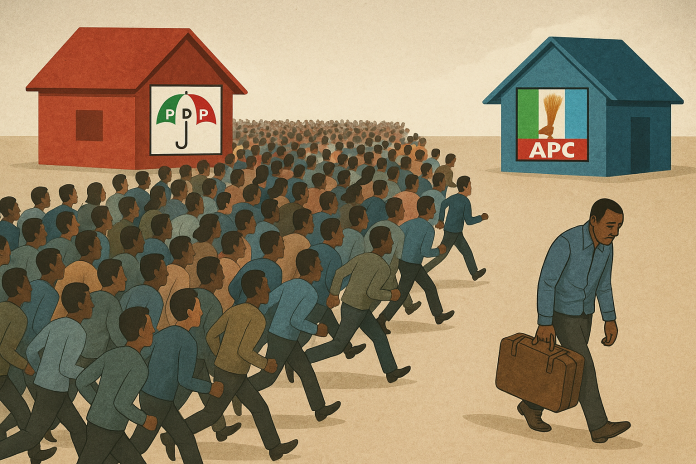By Newspot Nigeria Editorial Desk
In democracies around the world, party defection—where politicians switch allegiances from one party to another—is often viewed with skepticism. But in Nigeria, this political dance has become more than an occasional scandal; it is now a defining feature of our democratic landscape.
Time and again, high-profile opposition figures abandon their parties to join the ruling party. Some see this as opportunism, others as betrayal. But beneath the headlines lies a deeper truth: the system rewards it.
1. Survival in a Winner-Takes-All Arena
Nigeria’s political architecture is built on a winner-takes-all framework. Research by the African Development Bank and democracy scholars like Nic Cheeseman in Democracy in Africa confirms that access to state power is the lifeblood of political survival in many African democracies. Peter Mbah describes how in Nigeria, state power is “a major means of production,” incentivizing politicians to defect when in opposition to avoid political irrelevance.
Similarly, Victor Egwemi (2019) argued in a paper presented to INEC that Nigeria’s winner-takes-all governance leaves the opposition as “an island of frustration,” where politicians are shut out from the levers of power, thus encouraging mass defections post-election.
2. Patronage and the Power of the Purse
A 2018 report by the Centre for Democracy and Development (CDD) observed that defections often surge close to elections. Nigeria’s political system is heavily patronage-based. E.F. Obani (2023) highlights how defections are fueled by politicians’ desire to stay close to “the corridors of power” for access to contracts, appointments, and resources. This pattern mirrors broader African dynamics, as Adebayo O. (2008) explains that dominant ruling parties attract defectors through promises of patronage and protection.
3. Where Is the Ideology?
In theory, political parties are ideological homes—left or right, liberal or conservative, progressive or traditionalist. In Nigeria, that’s rarely the case.
Professor Jibrin Ibrahim has consistently argued that Nigerian parties lack distinct ideologies and are primarily vehicles for seizing power. A peer-reviewed study by Talatu B. Buba and Adamu B. Matawal (2024) supports this view, noting that most politicians in Nigeria switch parties based on self-interest, not ideology. Victor Egwemi (2010) emphasized that there’s “no pretense about ideology” among politicians, normalizing frequent defections.
4. Defect or Be Targeted
Opposition politicians often face harassment or targeted prosecutions, pushing them to defect as a survival strategy. According to Obani (2023), many defect to avoid being targeted by anti-corruption agencies and to remain “economically relevant” under the ruling regime. APC Chairman Adams Oshiomhole reinforced this perception, famously declaring in 2019, “Once you join the APC, your sins are forgiven.”
Such statements suggest that anti-corruption enforcement may be used selectively, reinforcing the idea that political defection can serve as a shield against prosecution.
5. Strategic Ambition and the Long Game
Not all defections are driven by fear or desperation. Some are calculated moves toward future political goals. Mbah (2011) explains that personal ambition—whether to secure nominations, access appointments, or gain advantage for upcoming elections—is a major driver of defections. Buba and Matawal (2024) further note that politicians often defect after losing primaries, in pursuit of better platforms to realize their ambitions.
In Nigeria’s fluid party system, cross-carpeting is often a rational decision, not an ideological betrayal but a tactical shift.
The Real Crisis: Systemic, Not Personal
Nigeria’s defection problem is not about a few disloyal politicians. It is about a political system that incentivizes betrayal, silences ideology, and rewards proximity to power over public service.
Until we reform this system—by strengthening party structures, protecting institutional independence, and decentralizing governance—defections will continue to be a symptom of survival, not treachery.
At Newspot Nigeria, we urge citizens to look beyond the headlines and demand deeper reforms. Let us not only critique the defectors, but also dismantle the system that makes defection logical and loyalty irrational.
Only then can we build a democracy where conviction—not convenience—guides political allegiance.
Share your story or advertise with us: Whatsapp: +2347068606071 Email: info@newspotng.com

















